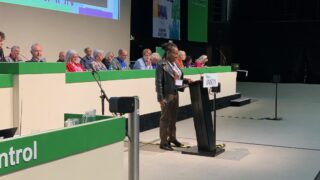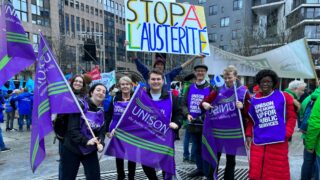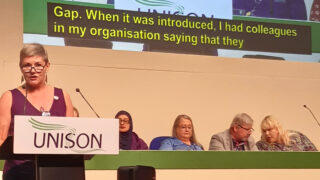Debate at UNISON’s 2013 national delegate conference got under way in Liverpool this morning, with a major composite motion on employment and trade union rights.
First at the podium was Pat McDonagh from the North West region, who pointed out that 90% of people in the country don’t know this attack on employment rights is happening.
“The weakness of their democratic mandate does not stop them pushing forward with these attacks,” he continued.
“It’s women and young people who will be most affected by it, so why are they doing it?
“The economy is being held back by a lack of consumer confidence,” he explained, not by the system of employment tribunals. It is also intended to limit compensation, so low-paid workers who are wrongly dismissed can “end up out of pocket” even after a tribunal has found in their favour.
It is a “feckless attitude toward employment rights”.
Gordon McKay for the NEC said that the government should be encouraging growth and new jobs, but instead, they’re trying to get people to “sign away employment rights for worthless shares” and “say goodbye to health and safety”.
He went on to observe that the UK is already one of the most deregulated employment markets, but added that: “This is about Tory political dogma – and nothing else.
“Enough of the polite applause – it’s time to get angry.”
Margaret Greer from Hammersmith and Fulham stressed the racism that cuts and job losses is revealing, telling conference that “Black workers are last to be hired and first to be fired,” as she pointed out that the proposed changes would negatively affect the ability of Black workers to take action against unfair dismissals.
“Across the world, those at the top of society have seen an opportunity and are seizing it,” said another delegate. Our employment rights “were not just given to us,” but “were won”, he added.
Conference backed a raft of measures to fight for trade union and employment rights, including:
- calling on the NEC to continue to campaign and publicise the systematic government attack on employment and union rights;
- to link the attack on employment and union rights to the government’s austerity, cuts, privatisation, inequality and privatisation agenda;
- to support the European Public Services Union, the TUC, STUC, WTUC and ICTU in their campaigns to defend employment rights.
Conference also condemned the government’s attacks on disabled people, and the sham of the work capability assessments that sees seriously ill people being declared fit for work.
Peter Stafford for the national disabled members’ committee, cited examples of people who had died just after being declared ‘fit’ by doctors that had not taken the Hippocratic Oath but a hypocritic one instead.
And he suggested that any incoming Labour government should start work with “a dangerous Tories act – that’d keep the vets busy.”
Delegates set the national executive council a number of tasks, including:
- joining calls for the immediate abandonment of the work capability assessment;
- affiliating with any appropriate organisations of disabled people that are campaigning on the issues;
- promoting existing assessment guidance that is issued by Atos or other medical practitioners who carry out assessments.









